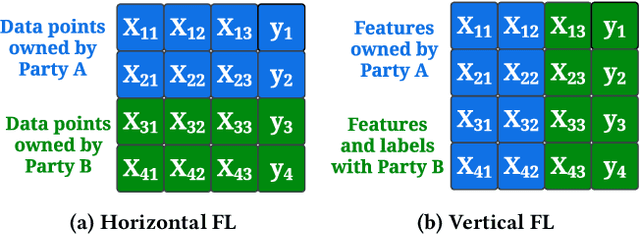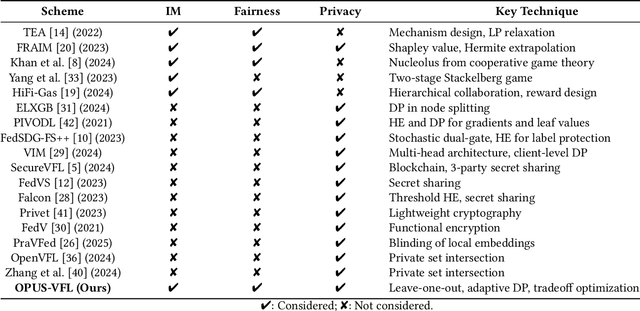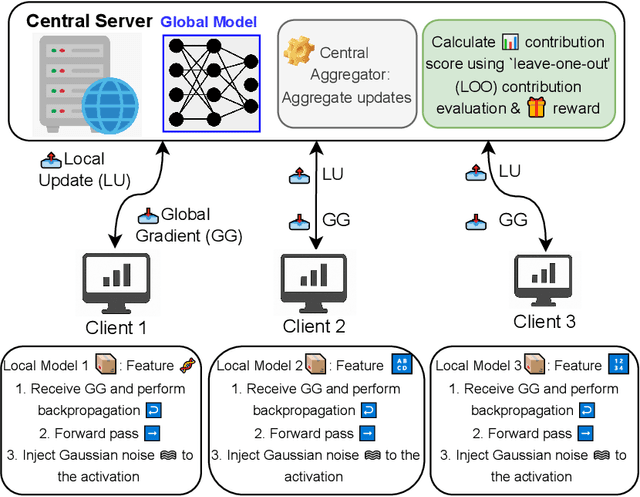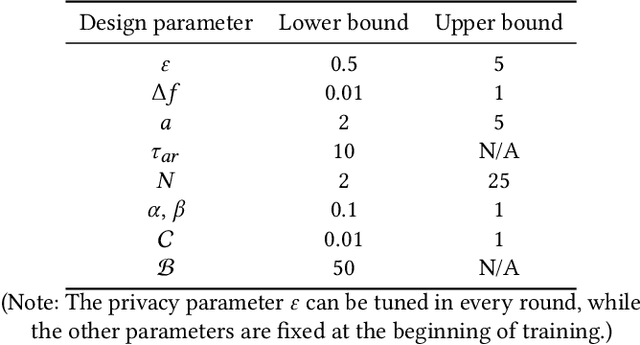Sindhuja Madabushi
MURIM: Multidimensional Reputation-based Incentive Mechanism for Federated Learning
Dec 15, 2025Abstract:Federated Learning (FL) has emerged as a leading privacy-preserving machine learning paradigm, enabling participants to share model updates instead of raw data. However, FL continues to face key challenges, including weak client incentives, privacy risks, and resource constraints. Assessing client reliability is essential for fair incentive allocation and ensuring that each client's data contributes meaningfully to the global model. To this end, we propose MURIM, a MUlti-dimensional Reputation-based Incentive Mechanism that jointly considers client reliability, privacy, resource capacity, and fairness while preventing malicious or unreliable clients from earning undeserved rewards. MURIM allocates incentives based on client contribution, latency, and reputation, supported by a reliability verification module. Extensive experiments on MNIST, FMNIST, and ADULT Income datasets demonstrate that MURIM achieves up to 18% improvement in fairness metrics, reduces privacy attack success rates by 5-9%, and improves robustness against poisoning and noisy-gradient attacks by up to 85% compared to state-of-the-art baselines. Overall, MURIM effectively mitigates adversarial threats, promotes fair and truthful participation, and preserves stable model convergence across heterogeneous and dynamic federated settings.
PRIVEE: Privacy-Preserving Vertical Federated Learning Against Feature Inference Attacks
Dec 14, 2025Abstract:Vertical Federated Learning (VFL) enables collaborative model training across organizations that share common user samples but hold disjoint feature spaces. Despite its potential, VFL is susceptible to feature inference attacks, in which adversarial parties exploit shared confidence scores (i.e., prediction probabilities) during inference to reconstruct private input features of other participants. To counter this threat, we propose PRIVEE (PRIvacy-preserving Vertical fEderated lEarning), a novel defense mechanism named after the French word privée, meaning "private." PRIVEE obfuscates confidence scores while preserving critical properties such as relative ranking and inter-score distances. Rather than exposing raw scores, PRIVEE shares only the transformed representations, mitigating the risk of reconstruction attacks without degrading model prediction accuracy. Extensive experiments show that PRIVEE achieves a threefold improvement in privacy protection compared to state-of-the-art defenses, while preserving full predictive performance against advanced feature inference attacks.
OPUS-VFL: Incentivizing Optimal Privacy-Utility Tradeoffs in Vertical Federated Learning
Apr 22, 2025



Abstract:Vertical Federated Learning (VFL) enables organizations with disjoint feature spaces but shared user bases to collaboratively train models without sharing raw data. However, existing VFL systems face critical limitations: they often lack effective incentive mechanisms, struggle to balance privacy-utility tradeoffs, and fail to accommodate clients with heterogeneous resource capabilities. These challenges hinder meaningful participation, degrade model performance, and limit practical deployment. To address these issues, we propose OPUS-VFL, an Optimal Privacy-Utility tradeoff Strategy for VFL. OPUS-VFL introduces a novel, privacy-aware incentive mechanism that rewards clients based on a principled combination of model contribution, privacy preservation, and resource investment. It employs a lightweight leave-one-out (LOO) strategy to quantify feature importance per client, and integrates an adaptive differential privacy mechanism that enables clients to dynamically calibrate noise levels to optimize their individual utility. Our framework is designed to be scalable, budget-balanced, and robust to inference and poisoning attacks. Extensive experiments on benchmark datasets (MNIST, CIFAR-10, and CIFAR-100) demonstrate that OPUS-VFL significantly outperforms state-of-the-art VFL baselines in both efficiency and robustness. It reduces label inference attack success rates by up to 20%, increases feature inference reconstruction error (MSE) by over 30%, and achieves up to 25% higher incentives for clients that contribute meaningfully while respecting privacy and cost constraints. These results highlight the practicality and innovation of OPUS-VFL as a secure, fair, and performance-driven solution for real-world VFL.
Empirical Analysis of Privacy-Fairness-Accuracy Trade-offs in Federated Learning: A Step Towards Responsible AI
Mar 20, 2025Abstract:Federated Learning (FL) enables collaborative machine learning while preserving data privacy but struggles to balance privacy preservation (PP) and fairness. Techniques like Differential Privacy (DP), Homomorphic Encryption (HE), and Secure Multi-Party Computation (SMC) protect sensitive data but introduce trade-offs. DP enhances privacy but can disproportionately impact underrepresented groups, while HE and SMC mitigate fairness concerns at the cost of computational overhead. This work explores the privacy-fairness trade-offs in FL under IID (Independent and Identically Distributed) and non-IID data distributions, benchmarking q-FedAvg, q-MAML, and Ditto on diverse datasets. Our findings highlight context-dependent trade-offs and offer guidelines for designing FL systems that uphold responsible AI principles, ensuring fairness, privacy, and equitable real-world applications.
 Add to Chrome
Add to Chrome Add to Firefox
Add to Firefox Add to Edge
Add to Edge